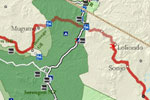Famed anthropologist and conservationist Richard Leakey has proposed a possible solution to the hugely controversial Serengeti road: build an elevated highway. Leakey made the remarks during a conference at Rutgers University on May 14th, as reported by Live Science. The Tanzanian government’s plans to build a road through the remote, northern Serengeti has come under both environmental and international criticism, as scientific studies and leaked government reports have found the proposed road would hugely hamper the world famous migration across the plans.
“It would be a grand spectacle, to see animals migrating by underneath, and signal Africa’s commitment to wildlife,” Leakey reportedly said. “If I can drive over 30 miles of elevated highways in New Jersey, why not in the Serengeti?”
The costs of building the highway would rise by some 40 percent, but once construction was finished the migration could continue largely unimpeded, according to Leakey.
Leakey first brought up the idea of an elevated highway in 2010, but few took notice of it. However as the proposal for a 30 mile (50 kilometer) highway through the Serengeti appears stalled, the Tanzanian government may be ready to look at other options.
In fact, plans to build the road have gone through several changes. In 2011, it was widely reported that the road project had been cancelled. But in fact, Tanzania clarified that it still planned to go ahead with the road, only that it would be unpaved. However such plans haven’t dampened criticism: many fear that once a road is built, it will be only a matter of time before it is paved as traffic (according to government reports) will rise to some 3,000 vehicles a day by 2035.
Conservation groups have long offered another possible solution to the bypass: build a southern route that bypasses the northern Serengeti, while, in addition, construct small, local roads for remote villages in the northern Serengeti.

Elephants in Tanzania. Conservationists fear that not only will the migration be blocked, but many species could become road-kill victims to vehicles, including large commercial trucks. Photo by: Rhett A. Butler.
Related articles
Vanishing corridors: trying to keep big animals on the move across Tanzania

(12/10/2012) One of the biggest challenges for big African wildlife like lions, elephants, and buffalo is movement across native habitat that is increasingly being encroached on by humans. Animals find their movement restricted by roads, fences, and property boundaries which fragment the landscape. Without safe, smart, and well-maintained corridors between designated wildlife areas, animals can get cut off from resources needed for survival and from potential mates (putting genetic health at risk), even while conflicts with humans become more frequent.
Poaching in the Serengeti linked to poverty, high legal hunting prices
(07/09/2012) In the effort to protect the Serengeti—arguably Africa’s most famous ecosystem—one of the major problems is the bushmeat trade. Population growth, little available protein, poverty, and a long-standing history of hunting has led many communities to poach wildlife within Serengeti National Park. Interviewing over a thousand community members in the western Serengeti, scientists found that community members are largely aware that wildlife hunting is illegal and that conservation of wild species is important, but hunt animals anyway partly out of necessity.
Legal case against Serengeti road moves forward
(03/21/2012) A regional case against the construction of a proposed road through Serengeti National Park has moved to trial after a judge with the East African Court of Justice (EACJ) threw out concerns by Tanzania reports the Daily Nation. The government of Tanzania has proposed a controversial highway that would bifurcate the northern part of the Serengeti National, only to see their plans stalled by a lawsuit filed by the Kenyan-based NGO, Africa Network for Animal Welfare (ANAW), which argues that the road could have massive consequences for the entire Serengeti ecosystem, a view shared by many scientists.
Richard Leakey: ‘selfish’ critics choose wrong fight in Serengeti road

(07/02/2011) The controversial Serengeti road is going ahead, but with conditions. According to the Tanzanian Minister for Natural Resources and Tourism, Ezekiel Maige, the road will not be paved and it will be run by the Tanzanian park authority who will have the power to monitor traffic to ‘ensure no harm comes to the wildlife population’. Critics argue that even an unpaved road would eventually cripple the largest land migration in the world. However, famed Kenyan conservationist, ex-politician, and anthropologist, Richard Leakey, told mongabay.com that critics of the road are focusing on the wrong fight while failing to respect Tanzania’s right to develop. Leakey says that instead of attempting to stop the road from being built, which he believes is inevitable, critics should instead focus on funding a truly wildlife-friendly road.
Unpaved road through Serengeti to progress

(07/02/2011) After a week of confusion, the Tanzanian government has finally clarified its position on the hugely-controversial Serengeti road. The Minister for Natural Resources and Tourism, Ezekiel Maige, confirmed that a paved highway will not be built through the northern Serengeti National Park, however the government is still planning to construct a gravel road through the park. Yet critics have long warned that even an unpaved road would open Pandora’s box: eventually commercial and population pressure would push the road to be paved, widened, and fenced leading to a collapse of the world’s largest remaining-and most famous-land migration. Two million wildebeest, zebra, and Thomson’s gazelle pass along this route in annual migration from Tanzania to Kenya.

(04/14/2011) What’s happening in Tanzania? This is a question making the rounds in conservation and environmental circles. Why is a nation that has so much invested in its wild lands and wild animals willing to pursue projects that appear destined not only to wreak havoc on the East African nation’s world-famous wildlife and ecosystems, but to cripple its economically-important tourism industry? The most well known example is the proposed road bisecting Serengeti National Park, which scientists, conservationists, the UN, and foreign governments alike have condemned. But there are other concerns among conservationists, including the fast-tracking of soda ash mining in East Africa’s most important breeding ground for millions of lesser flamingo, and the recent announcement to nullify an application for UNESCO Heritage Status for a portion of Tanzania’s Eastern Arc Mountains, a threatened forest rich in species found no-where else. According to President Jakaya Kikwete, Tanzania is simply trying to provide for its poorest citizens (such as communities near the Serengeti and the Eastern Arc Mountains) while pursuing western-style industrial development.
Serengeti road project opposed by ‘powerful’ tour company lobby
(03/16/2011) Government plans to build a road through Serengeti National Park came up against more opposition this week as the Tanzanian Association of Tour Operators (Tato) came out against the project, reports The Citizen. Tato, described as powerful local lobby group by the Tanzanian media, stated that the road would hurt tourism and urged the government to select a proposed alternative route that would by-pass the park. Tato’s opposition may signal a shift to more local criticism of the road as opposition against the project has come mostly from international environmentalists, scientists, and governments.
First International Serengeti Day hopes to halt road project

(02/23/2011) On March 19th the conservation organization, Serengeti Watch, is planning the world’s first International Serengeti Day to celebrate one of the world’s most treasured wildlife ecosystems. But the day also has another goal: bring attention to a Tanzanian government plan to build a road that would essentially cut the ecosystem, threatening the world’s largest mammal migration. “The proposed road will be a major commercial route that cuts across a narrow stretch of the Park near the border with Kenya. It goes through a wilderness zone critical to the annual migration of 1.3 million wildebeest and 0.7 million zebras, antelope, and other wildlife. This will involve extracting a strip of land from the Park itself, resulting in both the fragmentation of the ecosystem and the removal of the Serengeti National Park from the list of UN World Heritage Sites,” said David Blanton, co-founder of Serengeti Watch, in an interview with mongabay.com.
Leaked government study: road will damage Serengeti wildlife, despite president’s assurances
(02/10/2011) Tanzania’s President, Jakaya Kikwete, today gave promises that his proposed road project, which will bisect the Serengeti plains, would not hurt one of the world’s most famed parks and one of its last great land migrations. “The Serengeti is a jewel of our nation as well as for the international community. […] We will do nothing to hurt the Serengeti and we would like the international community to know this,” Kikwete said in a statement reported by the AFP. However, a government environment impact study, leaked to the conservation organization Serengeti Watch, paints a very different picture of how the road will damage the Serengeti. The report includes warnings that the road will ‘limit’ the migration of the plains’ 1.5 million wildebeest and 500,000 other herbivores including zebra.
Bushmeat trade pushing species to the edge in Tanzania
(02/06/2011) Hunters are decimating species in the Uzungwa Scarp Forest Reserve, a part of the Eastern Arc Mountains in Southern Tanzania, according to a new report compiled by international and Tanzanian conservationists. Incorporating three research projects, the report finds that bushmeat hunting in conjunction with forest degradation imperils the ecology of the protected area.
Scientists: road through Serengeti would likely end wildebeest migration
(02/02/2011) A new study finds that a proposed road cutting through Serengeti National Park would likely have devastating consequences for one of the world’s last great migrations. According to the study the road itself could lead to a 35% loss in the famed park’s migrating wildebeest herd, essentially cutting the herd down by over half a million animals. Despite such concerns, and the availability of an alternative route that would bypass the Serengeti plains altogether, the Tanzanian government has stated it is going ahead with the controversial road.







